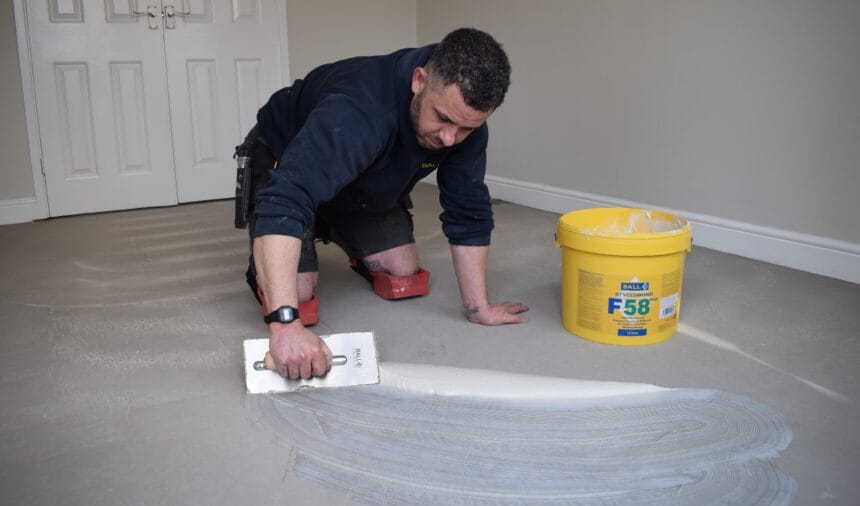Selecting the optimum vinyl adhesive

Contractors installing vinyl floorcoverings face a potentially confusing array of adhesives to choose from. These include adhesives with special features such as temperature tolerance, pressure sensitive characteristics and water resistance. Stephen Boulton, technical services manager at F. Ball, provides a straightforward guide to choosing the optimum vinyl adhesive for the job.
Standard, wet-lay adhesives are available for installing almost any type of vinyl sheet or tile floorcovering. The contractor simply applies the adhesive evenly over the subfloor using a trowel and allows it to dry slightly before placing the floorcoverings and finally rolling to ensure good overall contact.
There are also situations where it may be desirable, or even highly recommended, to use an adhesive with specialist properties. Adhesive selection should be based on the specifics of a flooring installation, and it is always advisable that contractors check the compatibility of adhesives and particular floorcoverings.
Vinyl tiles or planks
While wet-lay adhesives are fine where an immediate bond is not required, pressure sensitive adhesives are often the best choice for installing vinyl tiles or planks. They form an instant grab upon contact, so contractors don’t need to worry about tiles or planks moving about when they are working, making them ideal for where intricate designs or patterns are being created.
Nowadays, pressure sensitive adhesives are available with a range of additional features, including temperature tolerance, for use where vinyl floorcoverings will be exposed to temperature fluctuations, such as conservatories and areas where floor to ceiling windows result in solar gain.
Moisture tolerance
When installing flooring in an area subject to high levels of humidity or surface water, an adhesive with water resistant properties is essential. An adhesive that isn’t water resistant may break down and soften when it comes into contact with water, potentially causing floorcoverings to bubble or de-bond.
Epoxy or polyurethane-based adhesives have long been the only option for such installations. These adhesives are highly effective at making areas impermeable to water, so they are also suitable for installing vinyl floorcoverings outdoors where surface water may collect. Nowadays, solvent-free, one-part alternatives are available that are also easier to apply and faster curing, such as Styccobond F73.
Hybrid adhesives
Styccobond F49 is an example of a new breed of high-performance, hybrid adhesive, with revolutionary combinations of properties, including temperature tolerance, pressure sensitive characteristics and more. The water-based adhesive has the familiar characteristics of a pressure sensitive adhesive and develops the extremely high bond strength required to hold vinyl floorcoverings firmly in place in areas exposed to extreme temperature fluctuations (from -20°C to +60°C). The properties of this adhesive also make it moisture resistant, meaning it is suitable for installing vinyl floorcoverings in damp and humid environments.
Fast-track solutions
Options are also available where contractors face considerable time pressures and a moisture resistant or temperature tolerant adhesive is not required. One of these options is Styccobond F58 PLUS. Developed as a ‘transitional’ adhesive, Styccobond F58 PLUS transitions from a wet-lay adhesive when initially applied to a subfloor, through a semi-wet stage to become fully pressure sensitive.
Floorcovering compatibility
Flooring contractors should always check that an adhesive is suitable for use with a particular floorcovering. For these purposes F. Ball produces its industry-leading Recommended Adhesives Guide (RAG®). Alternatively, F. Ball’s technical service department are on hand Monday to Friday, 8.30am – 5.00pm, to answer your questions about F. Ball products and how to use them.
